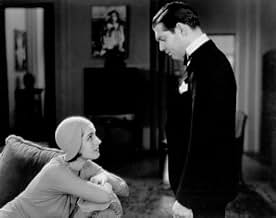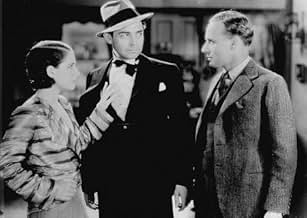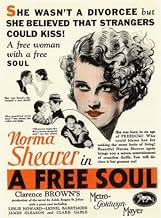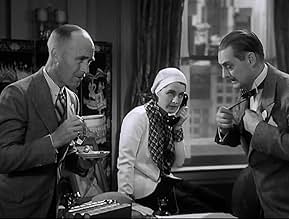CALIFICACIÓN DE IMDb
6.6/10
3.1 k
TU CALIFICACIÓN
Un abogado alcohólico que defendió con éxito a un notorio jugador acusado de asesinato se opone cuando su hija de espíritu libre se involucra románticamente con él.Un abogado alcohólico que defendió con éxito a un notorio jugador acusado de asesinato se opone cuando su hija de espíritu libre se involucra románticamente con él.Un abogado alcohólico que defendió con éxito a un notorio jugador acusado de asesinato se opone cuando su hija de espíritu libre se involucra románticamente con él.
- Dirección
- Guionistas
- Elenco
- Ganó 1 premio Óscar
- 4 premios ganados y 2 nominaciones en total
Roscoe Ates
- Man Shot at in Men's Room
- (sin créditos)
Ann Brody
- Hamburger Saleslady
- (sin créditos)
Edward Brophy
- Slouch
- (sin créditos)
Clarence Burton
- Detective
- (sin créditos)
James Donlan
- Reporter
- (sin créditos)
Bess Flowers
- Birthday Party Guest
- (sin créditos)
Francis Ford
- Skid Row Drunk
- (sin créditos)
Henry Hall
- Detective in Raid
- (sin créditos)
George Irving
- Johnson - Defense Attorney
- (sin créditos)
Edward LeSaint
- Judge
- (sin créditos)
Eric Mayne
- Party Guest
- (sin créditos)
Sam McDaniel
- Casino Valet
- (sin créditos)
Opiniones destacadas
A Free Soul (1931)
Clark Gable says, "I'm telling you." And Norma Shearer, dressed in a sexy silk dress, replies, "Oh no, you're not. Nobody is."
That sums up this astonishing movie. I can't believe A Free Soul is so little known, or that so many viewers don't get the depth of its meaning then...and now. Throw in three of the most amazing actors of the early 1930s--Lionel Barrymore, Clark Gable, and Norma Shearer--and you can't help be impressed, and moved, and intrigued. It's about strength of character (three or four characters, in fact). It's about being a modern person, and having modern problems. And it's about facing them, openly, honestly.
So what holds it back? Well, for one thing, it has a lot of talk, a lot of simple dialog about some very not simple things. If you accept the characters and their need to talk, you will see a very honest confrontation with alcoholism, and with what is at first a kind of sex addiction, or what is later developed to be simply unbridled love for a man outside of marriage. But the parallel between two temptations is real, and rather powerful, and the sacrifices each of the two afflicted characters make is intense. Barrymore (as the one nipping the bottle) and Shearer (as the one too much in love, or in love with lovemaking) play their parts perfectly. They have moments of extraordinary clarity, and moments of abandonment. And they confront each other in a way that is completely reasonable.
There are other aspects here worth at least lifting an eyebrow at, namely the very close relationship, almost as platonic lovers, between these two. Gable as a lovable but brutal and deceptive gangster is perfect, too--gorgeous and hard, charming and untrustworthy. The milieu is well developed, from barroom to hotel room to courtroom. This isn't a Warner Brothers knock-you-out crime film, it isn't even Three on a Match, for an example of a compromise between a woman's picture and a gangster flick. It's a heady drama, beautifully laid out and progressively involving, with director Clarence Brown (famous for a whole string of such interpersonal, romantic dramas over several decades) knowing what makes a film really matter.
Clark Gable says, "I'm telling you." And Norma Shearer, dressed in a sexy silk dress, replies, "Oh no, you're not. Nobody is."
That sums up this astonishing movie. I can't believe A Free Soul is so little known, or that so many viewers don't get the depth of its meaning then...and now. Throw in three of the most amazing actors of the early 1930s--Lionel Barrymore, Clark Gable, and Norma Shearer--and you can't help be impressed, and moved, and intrigued. It's about strength of character (three or four characters, in fact). It's about being a modern person, and having modern problems. And it's about facing them, openly, honestly.
So what holds it back? Well, for one thing, it has a lot of talk, a lot of simple dialog about some very not simple things. If you accept the characters and their need to talk, you will see a very honest confrontation with alcoholism, and with what is at first a kind of sex addiction, or what is later developed to be simply unbridled love for a man outside of marriage. But the parallel between two temptations is real, and rather powerful, and the sacrifices each of the two afflicted characters make is intense. Barrymore (as the one nipping the bottle) and Shearer (as the one too much in love, or in love with lovemaking) play their parts perfectly. They have moments of extraordinary clarity, and moments of abandonment. And they confront each other in a way that is completely reasonable.
There are other aspects here worth at least lifting an eyebrow at, namely the very close relationship, almost as platonic lovers, between these two. Gable as a lovable but brutal and deceptive gangster is perfect, too--gorgeous and hard, charming and untrustworthy. The milieu is well developed, from barroom to hotel room to courtroom. This isn't a Warner Brothers knock-you-out crime film, it isn't even Three on a Match, for an example of a compromise between a woman's picture and a gangster flick. It's a heady drama, beautifully laid out and progressively involving, with director Clarence Brown (famous for a whole string of such interpersonal, romantic dramas over several decades) knowing what makes a film really matter.
Norma Shearer slinks and giggles her way through another melodrama, this one noted for not only her but the presence of Lionel Barrymore, Clark Gable and Leslie Howard.
Not a bad cast, eh?
The story has a lot to it, too - too much to go into here. It's basically a father-daughter story with the daughter having a good guy and a bad guy both after her, and her taking in all the attention she can get. I've only seen two Norma Shearer films but she played a similar character in both. She's likes to giggle, show off her body and flirt but doesn't want commitments. (The Divorcée was the other film in which I saw her.) For much of this film, this is a gender-reversal with the woman being the "heel."
Barrymore plays her dad, an alcoholic defense attorney. If, for nothing else in this movie, he's remembered for his impassioned speech at the end of the trial. It WILL get your attention! Clark Gable plays the toughie and Howard plays the suave nice-guy both vying for Shearer's love.
There is truth to a number of things in this film such as "Jan Ashe" (Shearer) finding the not-so-nice guy more "exciting" over a genuine gentleman. Why many women are like that - preferring the grubby-looking thug - who knows, but Shearer is good at playing that role. Shearer's Harlow-like attire and no-bra look got my (and Gable's) attention, too.
The movie should be enjoyed by most who like this kind of a melodrama and/or appreciate good acting and a bit of star-gazing.
Not a bad cast, eh?
The story has a lot to it, too - too much to go into here. It's basically a father-daughter story with the daughter having a good guy and a bad guy both after her, and her taking in all the attention she can get. I've only seen two Norma Shearer films but she played a similar character in both. She's likes to giggle, show off her body and flirt but doesn't want commitments. (The Divorcée was the other film in which I saw her.) For much of this film, this is a gender-reversal with the woman being the "heel."
Barrymore plays her dad, an alcoholic defense attorney. If, for nothing else in this movie, he's remembered for his impassioned speech at the end of the trial. It WILL get your attention! Clark Gable plays the toughie and Howard plays the suave nice-guy both vying for Shearer's love.
There is truth to a number of things in this film such as "Jan Ashe" (Shearer) finding the not-so-nice guy more "exciting" over a genuine gentleman. Why many women are like that - preferring the grubby-looking thug - who knows, but Shearer is good at playing that role. Shearer's Harlow-like attire and no-bra look got my (and Gable's) attention, too.
The movie should be enjoyed by most who like this kind of a melodrama and/or appreciate good acting and a bit of star-gazing.
Johnny Cochrane must've learned some legal tricks from this old movie. For example, at the beginning of the movie, Lionel Barrymore gets Clark Gable acquitted of first degree murder when he places the hat found at the scene of the crime on Clark's head ... clearly the hat is too small. The court and jury laugh, and Clark is set free!
This entire movie was great -- much better than I had expected. I saw two Norma Shearer movies recently with a similar-sounding plot recap: Their Own Desire (Norma Shearer falls for the son of her father's illicit lover), and this one, A Free Soul (Norma Shearer falls for her lawyer father's mobster client). Having watched Their Own Desire first and not being impressed with it, I wondered if I should even bother with A Free Soul. But bother I did, and I'm glad for it. It was an excellent movie.
Lionel Barrymore is the black sheep of his snooty, well-heeled family. His wife died while giving birth to their only child, Jan (Norma Shearer). Being the black sheep, Lionel raised Norma to be a "free soul", to not be afraid of anyone or anything, to not be afraid to make mistakes, and to pick herself up and dust herself off whenever she did find herself in trouble. This has apparently worked well for Norma, until she meets and eventually tries to get away from Clark Gable. Norma finally learns there are consequences to all actions, that one can't be a "free soul" without it having some type of repercussion on one's life.
We also have Lionel Barrymore (whom I always love in anything I see him in) this time very compelling as a brilliant alcoholic lawyer who loves his daughter more than anything but who ultimately doesn't know how to protect her. He disappoints her, and he disappoints himself, but in the end he seeks to right his wrongs by defending Norma's ex-fiancé (to say more would be to possibly spoil the movie).
This movie was fresh, and the characters were sympathetically developed without ever resorting to being maudlin or melodramatic. This movie was also chock-full of great lines. For example:
(Lionel to Clark, upon learning Clark wants to marry Norma) - "The only time I hate democracy is when one of you mongrels forgets where you belong!"
(Norma to Clark, trying to get Clark to quit talking and make love to her) - "Men of action are better in action; they don't talk well."
Great early pre-code movie.
This entire movie was great -- much better than I had expected. I saw two Norma Shearer movies recently with a similar-sounding plot recap: Their Own Desire (Norma Shearer falls for the son of her father's illicit lover), and this one, A Free Soul (Norma Shearer falls for her lawyer father's mobster client). Having watched Their Own Desire first and not being impressed with it, I wondered if I should even bother with A Free Soul. But bother I did, and I'm glad for it. It was an excellent movie.
Lionel Barrymore is the black sheep of his snooty, well-heeled family. His wife died while giving birth to their only child, Jan (Norma Shearer). Being the black sheep, Lionel raised Norma to be a "free soul", to not be afraid of anyone or anything, to not be afraid to make mistakes, and to pick herself up and dust herself off whenever she did find herself in trouble. This has apparently worked well for Norma, until she meets and eventually tries to get away from Clark Gable. Norma finally learns there are consequences to all actions, that one can't be a "free soul" without it having some type of repercussion on one's life.
We also have Lionel Barrymore (whom I always love in anything I see him in) this time very compelling as a brilliant alcoholic lawyer who loves his daughter more than anything but who ultimately doesn't know how to protect her. He disappoints her, and he disappoints himself, but in the end he seeks to right his wrongs by defending Norma's ex-fiancé (to say more would be to possibly spoil the movie).
This movie was fresh, and the characters were sympathetically developed without ever resorting to being maudlin or melodramatic. This movie was also chock-full of great lines. For example:
(Lionel to Clark, upon learning Clark wants to marry Norma) - "The only time I hate democracy is when one of you mongrels forgets where you belong!"
(Norma to Clark, trying to get Clark to quit talking and make love to her) - "Men of action are better in action; they don't talk well."
Great early pre-code movie.
Having just seen the Free Soul (1931), I was struck with how much Gable's character foretold his similarly famous role as Rhett Buttler in the 1939 film, Gone with the Wind. The plot situations in the two movies were also very similar, a different time and setting. I noticed the role of the fathers were almost identical. Barrymore's patriarchal role was just as intense as Scarlet's father. Norma Shearer's free soul character was similar but more understandable and empathetic than Scarlet's continuous self-centeredness. The coincidence of the similarity of Leslie Howard's role in both films as the jilted lover was striking. His acting got a lot better in Gone with the Wind. It was easy to see how Gable was destined to be somebody based on his performance in the 1931 film. I found viewing A Free Soul while comparing it to the more famous Civil War movie was an enjoyable experience.
I thought A Free Soul an interesting exploration into the world of addiction--father Stephen Ashe, as played by Lionel Barrymore, struggles to balance his career as a defense lawyer and the disastrous effects his alcoholism has on his family and social life. Daughter Jan (Norma Shearer) has a similar problem--but her addiction is to a free and easy lifestyle, with no commitments and no responsibility. Both seem to be ways of dealing with an unspoken loss--perhaps that of a wife and mother. Again, as with all good storytelling, backstory is only hinted at but the characters are rich enough to imply a great deal of history. Refreshing to see Clark Gable as a suave, handsome but ultimately despicable character. A surprising lack of stereotypes for such a film-the Ashes are a patrician, proper family who virtually disown Stephen and his daughter, but they are shown to be intelligent, unique people none the less. A wonderful, melodramatic exploration of the relationship of a father and daughter. Some nice location work for an early talkie.
¿Sabías que…?
- TriviaWhen the mule chases James Gleason, not a stuntman, is knocked down by the animal, a scene which wasn't planned, as Norma Shearer's reaction attests.
- ErroresAfter the cross-examination finishes, Stephen Ashe begins his summation to the jury. However, he is the defense attorney, and the prosecutor takes the first summation. This "factual mistake" is, in fact, not an absolute, as it depends on the state where the trial is held. For example, in a criminal case (which this is) in the Commonwealth of Pennsylvania, the defense goes first and the Commonwealth last. (If it were a civil case in PA, the Plaintiff would go first.)
- ConexionesFeatured in Some of the Best (1944)
- Bandas sonorasBy the River Sainte Marie
(1931) (uncredited)
Music by Harry Warren
Played as background music during the restaurant scene
Selecciones populares
Inicia sesión para calificar y agrega a la lista de videos para obtener recomendaciones personalizadas
- How long is A Free Soul?Con tecnología de Alexa
Detalles
- Fecha de lanzamiento
- País de origen
- Idioma
- También se conoce como
- A Free Soul
- Locaciones de filmación
- Yosemite National Park, California, Estados Unidos(Jan, her father and Eddie go camping)
- Productora
- Ver más créditos de la compañía en IMDbPro
Taquilla
- Presupuesto
- USD 529,000 (estimado)
- Tiempo de ejecución
- 1h 33min(93 min)
- Color
Contribuir a esta página
Sugiere una edición o agrega el contenido que falta




























